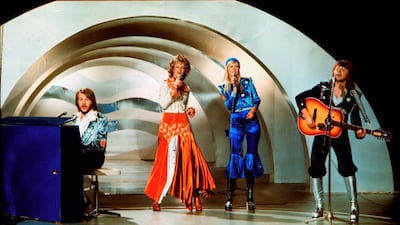It’s common for sports fans from countries with smaller populations to play a speculative game of arithmetic, calculating the number of Olympic medals won per capita – apparently a fairer measure of a nation’s athletic triumph. According to the Medals Per Capita website, Grenada’s single silver medal, from a population of just 107,000, made the tiny Caribbean country the true victors at Rio 2016.
It's unlikely anyone has ever applied such statistical rigour to music – but if a handy method existed to calculate global hit singles per capita, it seems certain Sweden would come out on top. The Scandinavian nation is home to only 10 million people and is ranked as one of the 40 most sparsely populated countries on Earth – yet from Abba to Avicii, and Roxette to Robyn, Sweden has played an outsized role in scoring pop gold. Here are the stats we do have: Sweden is the world's third-largest music exporter, and Swedes have scored more US Billboard number ones than any European country besides the UK. Yet unlike the contemporary global K-pop craze, or 1999's overnight "Latin Invasion", the Nordic nation's musical domination has not been tied to one specific style, movement, moment or trend.
Why so many Swedes pursue music
Nothing unites the anthemic 1980s rock of Europe's The Final Countdown with the plastic 1990s pop of Ace of Base. There's little thread linking indie group The Cardigans with post-punk revivalists The Hives, or folk-flavoured songwriter Jose Gonzalez with electro duo, The Knife. Dr Alban's evergreen Eurodance can't be compared to Basshunter's smarter trance flavours, and even the Save Tonight singer-songwriter Eagle-Eye Cherry sounds little like half-sister Neneh Cherry. There is no single "Swedish sound" to speak of.
When pondering the source of what has been dubbed the "Swedish Musical Miracle", it has become a necessary cliche for observers to ask: is there something in the water?
"The water is great in Sweden, but it has nothing to do with that," Livia Podesta, of the Swedish Institute's Events Unit, says with a laugh. Instead, she points to a different, widely championed Scandinavian public right: free education. Specifically, municipal music schools, which give youngsters the opportunity to experiment with several instruments from an early age. Meanwhile, a strong community of folk music culture still exists, she adds, with Sweden home to the highest number of choirs per capita in the world – about one in 16 Swedes are choir members.
"It's a clear political vision that provides free education, grants for musicians and wannabes and also subsidies to develop new technology," she says. "The Swedish state sees music as an asset, which can bring wealth in terms of export and recognition, and is actively investing in it. No doubt that this approach pays off."
How Abba influenced
Founded in the 1940s, these "kommunala musikskolan" gained increasing traction in the 1970s and 1980s – when every young aspiring musician had a ready role model in the immutable phenomenon of Abba. Reportedly the bestselling pop band since The Beatles with claimed global record sales of 380 million, Abba wrote some 18 number one international hit singles between 1972 and 1981 – propagating a slyly naive melodic approach and cheery, cheesy sound both distinctive and divisive, but nevertheless destined to play out company discos and club cheese nights for evermore.
Abba "definitely play a big part" in fuelling Sweden's continued musical dominance, says Caroline Fagerlind, director of Stockholm's Abba The Museum, one of the capital's most-visited attractions. "They put Sweden on the map in music history, and they have inspired many artists and next-generation songwriters that it's possible to reach success internationally, even coming from such a small country as Sweden," she says.
The era of Abba and municipal music schools inspired the chart wave to come, but according to figures quoted in The Atlantic, Sweden's music exports peaked in the 1990s – when musical royalty payments to Sweden from foreign markets were double the US per capita figure – before beginning to decline in 2003. What these stats hide is the role Swedish audio-doctors have continued to play behind the scenes in shaping the sound of the past two decades. In the late 1990s, manufactured boy bands Backstreet Boys, Nsync, Boyzone and Westlife all travelled to Stockholm's storied Cheiron Studios to produce hits – as did Britney Spears, who recorded breakout … Baby One More Time under the instruction of a certain Max Martin.
Martin has become the biggest producer in pop, crafting dozens of smashes – including 22 Billboard number ones for Katy Perry, Taylor Swift, Justin Timberlake and many more – which have defined modern music as much as anyone alive today. Close behind are frequent collaborator Shellback and Lady Gaga go-to RedOne – two more super-producer Swedes.
What about in other genres of music?
At the other end of the audio spectrum is Sweden's allure as a hot spot for heavy metal fans, home to reigning death metal bands Katatonia, Bloodbath and Amon Amarth, as well as pioneers of scary-sounding subgenres including opeth (progressive metal), candlemass (doom metal), bathory (black metal) and therion (symphonic metal), and the pyrotechnics of Yngwie J Malmsteen – rated by many as the world's greatest guitarist.
Perhaps the only unfortunate upshot of a nation bred on seeking success abroad is the cost to the domestic scene. Much like Martin – whose live-in studio sits in Frank Sinatra's former Hollywood home – unsigned rock acts today increasingly flock abroad. Stockholm-born rocker Allan Skjonsberg, 30, moved to London, where there are more opportunities for his underground metal band, Purple Kong. "I know EDM musicians who sell out instantly and rap shows are usually packed – with bands it's different," says the bassist of his home town. "It's cover gigs at local pizzerias or a sold-out arena, not much in between."
Abroad, the past decade’s EDM boom has proved an undeniable boon to Sweden, with the late Avicii and Swedish House Mafia’s former members Steve Angello, Sebastian Ingrosso and Axwell among the movement’s most successful figureheads.
More recently, in an era defined by identity and gender representation, socially egalitarian Sweden has reclaimed the zeitgeist with the success of female stars Zara Larsson, Tove Lo and Lykke Li, electro duo Icona Pop and the comeback of synth-pop auteur Robyn. Meanwhile, mixed heritage acts such as Mabel and Seinabo Sey represent a new rank of Swedish talent that breaks the blonde hair, blue eyes stereotype. This generation is helped in part by the Dh550 million the Swedish government allocates to arts grants annually.
It may be no coincidence that Swedes have played a parallel role in developing not just music, but the modern technology that today shapes how we consume it. Both predominant streaming service Spotify and SoundCloud – a free-for-all platform that allows any unsigned musician to publish their work, credited as a major driver for DIY talent discovery – were born in Sweden.
One can only speculate if the streaming gods have played an entirely unbiased role in programming their own, but it's undeniable that indie musicians such as Miike Snow, Gonzalez, Jens Lekman and Peter Bjorn and John have directly connected with SoundCloud's audience of 175 million.
So, no – it isn’t something in the water that fuels Sweden’s ongoing musical miracle. It’s a Scandinavian smorgasbord of sympathetic arts education, significant state support, communal choir culture, command of the technological infrastructure – and a snowballing self-belief built on the success of generations before. The rest of the music-making world has a lot to learn from Sweden.
Way Out Nordic
Close to 100,000 music fans will descend on Gothenburg, Sweden, from Thursday, August 8 until Saturday, August 10 for the annual Way Out West festival. Here are six Swedish female trailblazers who’ll be holding their own alongside the event’s international headliners.
Zara Larsson
A child star in Sweden since the age of 10, Larsson (pictured above) became a global dance-pop star in her teens with 2015's Lush Life and Never Forget You, and reached new heights with last year's Ruin My Life.
Seinabo Sey
Best known for 2013's breakout smash Younger, the half-Gambian soul-pop singer released her latest album, I'm a Dream, last year.
Silvana Imam
Raised by a Syrian stepfather, the half-Lithuanian rapper is known for attacking sociopolitical ills, including Europe’s rising far right and racism.
Veronica Maggio
This electropop singer co-wrote Avicii's smash Hey Brother and is currently touring her sixth album.
Cherrie
After fleeing Somalia as a child, Swedish-language rapper Cherrie strives for identity as a minority in Scandinavia.
Sabina Ddumba
Ddumba won Newcomer of the Year at 2015’s Swedish Grammis and is gearing up to release a third album.


